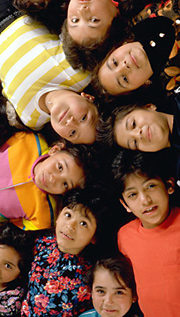 |
 |
 |
 News Around the Republic of Mexico | May 2005 News Around the Republic of Mexico | May 2005  
Social Programs Give Invaluable Lessons
 Rhona Statland de López - The Herald Rhona Statland de López - The Herald


| | Requiring students to perform social service is a good way to instill a commitment to try and better their community in a meaningful way. |
Many private high school students in Mexico live privileged lives. Their daily existence revolves around their friends and family and rarely do they leave this comfortable circle.

Some high schools are trying to change that by giving 11th and 12th graders a chance to help people who do not have the advantages that they take for granted. These schools require that students perform social service.

The Lancaster School in Mexico City started its program five years ago. "It was necessary to fulfill the philosophy of the school for students to know the world around them," says Catalina López, Director of social service at Lancaster. "Social service helps to sensitize them to others less fortunate and develops empathy in students who may have been a bit self-centered."

Ms. López recalls that when the program began, it was a voluntary exercise. At first, students didn't want to participate because it would interfere with their afternoon activities. But after becoming involved, they had such positive experiences that the following year, the program became mandatory and students were eager to sign up.

They worked with the disabled, taught English in an orphanage and visited an old age home, among other projects. "It has been gratifying to see the relationship develop between our teenage students and the elderly residents who are often isolated and lonely," says Ms. López. "The students think of them as their grandparents and become close to them. The kids have helped them more than any medicine."

The students have been helped as well. Their experience usually makes them more mature. After trying to teach English to orphans at Hogares Providencia, they develop a newfound respect for their own teachers when they themselves are confronted with challenges teaching the orphans. They ask their teachers for help, for example, with a child who is being bullied or how to discipline their charges without being too strict.

As a result, teachers and students at Lancaster School have acquired mutual respect for one another. The teachers are impressed when they see how lovingly the students treat the elderly and how dedicated they are to the orphans they are teaching. In turn, students realize how difficult it is to be an educator and begin to admire the efforts of their own teachers.

Greengates School offers the International Baccalaureate (IB) in which social service is an integral part of the program and students are required to do it in order to receive their diplomas. All Mexican public universities and some private ones also require a similar social contribution in order to graduate.

Some students work with handicapped children participating in the Special Olympics. They help to train them in basketball, swimming and floor hockey. "At first, students find it difficult working with children with different capacities," says Philippa (Pip) Kirkby, Coordinator of the IB's Creativity, Action and Service (CAS) program.

They soon become involved in the children's progress and feel gratified when the members of the Special Olympics advance in their sport. "They realize that a small step for them is a giant step for Special Olympics children," says Ms. Kirkby. "As a result, Greengates students begin to realize and appreciate their own skills. Several have decided to work with the handicapped after graduation."

Some students have opted to work with Habitat for Humanity, the organization popularized by former U.S. president Jimmy Carter in which volunteers help to build houses. The people who want a house have to own their own land. They can get the housing materials cheaply through the program. The labor comes from volunteers.

"The students like getting down and dirty and doing something physical," Kirkby observes. "They now know how to do things like lay a brick wall. More importantly, they get to see that many poor people may have skills that they don't and they get to see that there are other ways to live that are just as valid as theirs."

Other students work for the non-governmental organization Porvenir, which goes into poor, indigenous communities around Mexico to weigh babies and small children to see if they are undernourished. The families are provided with basics such as sugar, flour and cooking oil as well as "papilla," a mixture of nourishing ingredients that help babies as well as pregnant and nursing mothers get the proper nutrition. The students learn about these indigenous communities and see what is good about them while helping to provide an important service.

"We don't want our students to think that charity is just giving money or a one time thing," explains Ms. Kirkby. "We want to instill a commitment to try and better our community in a meaningful way."

Requiring students to perform social service is a good way to achieve that goal.

Rhona Statland de López is always interested in her readers' comments. Please address them to rhonav@gmail.com | 
 | |
 |



